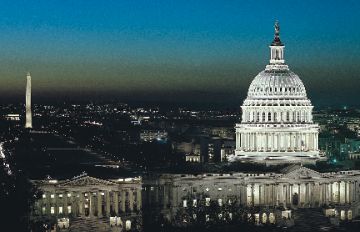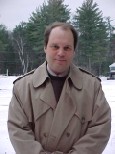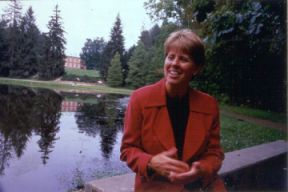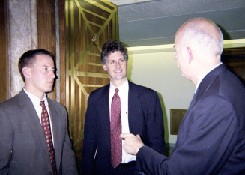aprilheader.html

Web
Features

Returning the Favor
by Maeve Boland
In 1973, two physicists, two electrical engineers, a mechanical engineer,
a public health researcher and a biophysicist came to Capitol Hill as the
first crop of congressional science fellows. This year, through the Congressional
Science and Engineering Fellowship program coordinated by the American
Association for the Advancement of Science (AAAS), about 40 scientists
and engineers are working on the Hill.
Sponsoring organizations fund a scientist or engineer to spend a year
working on the staff of a member of Congress or a congressional committee.
The program brings scientific expertise, scientist by scientist, to the
Hill at no cost to Congress. And the scientists learn how the political
and policy-making processes work.
 Over
its 28 years, the program has brought 693 scientists to the Capitol. Every
year, the demand for scientists among Hill offices is more than the program
can supply. Congressional offices prize science fellows, so much so that
the new chairman of the House Science Committee, Rep. Sherwood Boehlert
(R-N.Y.), has changed a rule enacted by the previous chairman that prevented
Congressional Science Fellows from working for the Science Committee.
Over
its 28 years, the program has brought 693 scientists to the Capitol. Every
year, the demand for scientists among Hill offices is more than the program
can supply. Congressional offices prize science fellows, so much so that
the new chairman of the House Science Committee, Rep. Sherwood Boehlert
(R-N.Y.), has changed a rule enacted by the previous chairman that prevented
Congressional Science Fellows from working for the Science Committee.
In 1977, the American Geophysical Union brought the geosciences into
the program by sponsoring Yacov Haimes, who worked for the House Committee
on Science, Space and Technology, and also for the White House Office of
Science and Technology Policy. He is now director of the Center for Risk
Management of Engineering Systems and a professor of systems engineering
at the University of Virginia. The Geological Society of America (GSA)
started a program in 1986 and is now sponsoring its 15th fellow, and the
American Geological Institute (AGI) this year is sponsoring its fourth
fellow. In all, 40 geoscience “graduates” of the American Geophysical Union
(AGU), GSA and AGI Congressional Science Fellowship programs are contributing
their talents and broad perspectives to the geoscience community. The AAAS
also sponsors its own scientists, and has brought geoscientists to the
program. And the Soil Science Society of America (SSSA), in a consortium
of agronomy, crop science, soil science and weed science societies, has
sponsored an additional 20 science fellows.
Two offices have been particularly popular with geoscience fellows.
Five fellows worked with the late Rep. George Brown (D-Calif.), former
chairman of the House Science Committee. Five geoscientists have worked
in Sen. Joseph Lieberman’s (D-Conn.) office: Murray Hitzman (GSA, 1993-1994),
Tamara Nameroff (GSA, 1996-1997), Kai Anderson (GSA, 1998-1999), Christy
Johnson (AAAS, 1999-2000) and current AGU Fellow Kirsten Banks Cutler.
Joyce Rechtschaffen, who worked on environmental affairs in Sen. Lieberman’s
office and is now minority staff director for the Senate Committee on Governmental
Affairs, says “The Fellows were all terrific. They brought great perspective
to the senators’ work and added a very important dimension to the office.
They were invaluable.”
Eos, Geotimes and GSA Today have published accounts
of fellows’ experiences during their fellowships, but for many, the real
benefits began after they left the program and used their new skills in
other spheres. Of the 40 geoscience fellows, eight now work in education,
21 in state, federal or policy positions, and 11 in business or consultancy.
This network of former fellows, spread through many organizations, is a
valuable resource for the geoscience community.
Following is a brief look at three former fellows — one in state government,
one in education and one in government relations — who have successfully
integrated their Washington experiences into different areas of the geosciences.
David Wunsch
Getting geoscience
knowledge to the right people
 David
Wunsch was the American Geological Institute’s Congressional Science Fellow
from 1998 to 1999, working with the majority staff of the House Subcommittee
on Energy and Mineral Resources. “In retrospect, I couldn’t have picked
a better choice,” he says. He considers his Washington experience invaluable
training for his current position as State Geologist of New Hampshire.
David
Wunsch was the American Geological Institute’s Congressional Science Fellow
from 1998 to 1999, working with the majority staff of the House Subcommittee
on Energy and Mineral Resources. “In retrospect, I couldn’t have picked
a better choice,” he says. He considers his Washington experience invaluable
training for his current position as State Geologist of New Hampshire.
[At left: David Wunsch became
the New Hampshire State Geologist last year after working 15 years with
the Kentucky Geological Survey. He was the American Geological Institute’s
Congressional Science Fellow from 1998-1999, working in the House Subcommittee
on Energy and Mining Resources. He earned his Ph.D. in hydrogeology from
the University of Kentucky in 1992. Photo by Dena Wunsch.]
Wunsch was already well versed in the importance of the earth sciences
to society before he was a fellow. His work on hydrogeological and geochemical
problems for the Kentucky Geological Survey brought him into close contact
with the practical implications of earth-science decisions. Working closely
with the federal Office of Surface Mining, he examined the impact of large
strip coal mines on water and the environment. He also dealt with water
supply issues and helped draft legislation with the State Water Management
Task Force and the Kentucky River Basin Steering Committee. Even with all
this experience, Wunsch found that his time in Washington was “very intriguing
and well worthwhile. It was one of the best years of my life.”
Understanding the legislative process and how to find information are
Washington skills that Wunsch draws on regularly for his work in New Hampshire.
He shares his expertise with other heads of state agencies and guides them
through the labyrinth of legislation to find key phrases buried in omnibus
bills and conference reports.
Thanks to his time in Washington, Wunsch can also find “hot issues”
to include in the state survey’s programs. As State Geologist, he needs
to be aware of what topics will be important in upcoming legislation, and
what projects are likely to attract funding. He learned to read the policy
and legislative winds, and he knows the right people to call. By “searching
out the insight,” Wunsch says, he can be proactive and constructive
in developing his plans for the state survey.
As a fellow, Wunsch adds, “I felt a lot of frustration about how information
isn’t getting to the right people.” He is working to ensure that geoscientists
address this problem. “There is a good reason why there is a p.r. [public
relations] person in every Senate and House office,” he says, adding that
each state survey could use an outreach person.
Some segments of science, particularly the medical sciences, receive
great publicity and financial support, but other groups are ignored. Scientists,
including the state geologists, Wunsch notes, foretold the energy problems
now facing the nation, but their message was overlooked. “The earth science
community needs to learn the lesson of getting information out at national
and local levels,” Wunsch says.
“Moreover, we need to become more effective at educating the media about
the relevance of earth science to our everyday lives.”
Jill Schneiderman
Bringing the
message to everyone
 Jill
Schneiderman is an associate professor of geology at Vassar College. She
worked as a Congressional Science Fellow in the office of Sen. Thomas Daschle
(D-S.D.) from 1994 to 1995, the year Daschle became Senate Minority Leader.
Jill
Schneiderman is an associate professor of geology at Vassar College. She
worked as a Congressional Science Fellow in the office of Sen. Thomas Daschle
(D-S.D.) from 1994 to 1995, the year Daschle became Senate Minority Leader.
[At left: Jill Schneiderman,
pictured here next to Sunset Lake on the Vassar College campus, was a Congressional
Science Fellow from 1994-1995 in the office of Sen. Thomas Daschle (D-S.D.)
before she joined Vassar as a professor. Before she was a science fellow,
she was an associate professor of geology at Pomona College and had
finished a one-year postdoctoral fellowship at the U.S. National Museum
of Natural History, where she studied the record of Sahara Desert climate
change in sediments of the Nile River delta. She earned her Ph.D.
in geology from Harvard University in 1987. Photo by Dixie Sheridan/Vassar
College]
Even before she started her fellowship, Schneiderman was aware of the
societal relevance of the earth sciences. But while working in the Senate,
she says, “I came to appreciate how, every day, I could relate [policy]
issues to the earth sciences.”
Flooding of the Missouri River is a major concern to residents and farmers
in South Dakota. Schneiderman used her geological expertise to advise Sen.
Daschle on the most practical responses to the problem. She also addressed
the interactions between geomorphology and forest health, along with many
other earth science issues. And she listened intently to Senate debates,
coming to understand how important it is for geoscientists to “make our
connection to the Earth more obvious, as it underlies so much of what we
deal with.”
Inspired by her fellowship experience, Schneiderman decided to do something
concrete to make the connection between people and Earth more obvious to
geoscientists and to the public: She devised and edited a major collection
of essays that focus on Earth, its history and processes, environmental
issues and what people can do to maintain a livable planet. The Earth
Around Us was published last year and is already being used in classrooms
around the country. Schneiderman deliberately aimed the book at a general
readership. She wanted geoscientists to communicate the excitement and
relevance of their science directly to the public. This perspective
— embracing a much wider audience than a traditional academic volume would
— comes from her fellowship experiences. “The book would not have happened
without the fellowship,” she says.
Taking this perspective to her Vassar students, Schneiderman has developed
a course on environmental justice and earth system science that she co-teaches
with Virginia Ashby Sharpe, a philosopher. The course attracts students
who otherwise might never encounter the earth sciences. Schneiderman uses
the opportunity to introduce the students to scientific principles in the
context of environmental policy and ethical issues. She draws on her understanding
of the legislative process and the legal framework of environmental and
resource issues to show the relationship between the earth sciences and
many of the challenges society faces.
“The fellowship showed me the relationship of geology to so much of
the business of Congress … and the importance of speaking your mind.”
She left Washington energized, her faith in the democratic process reinforced,
she says. A faith that she has already translated into action through her
teaching and her advocacy for civil rights, and by reaching a significant
and broad audience through The Earth Around Us.
Peter Folger
Building bridges
 Peter
Folger, GSA’s Congressional Science Fellow from 1995 to 1996, spent his
year on Capitol Hill in the office of Sen. Pete Domenici (R-N.M.), the
powerful chairman of the Senate Budget Committee. Folger returned to Colorado
after his fellowship but is now back inside the Beltway as public affairs
manager for AGU in Washington, D.C. “The fellowship is directly relevant
to my current job,” he says.
Peter
Folger, GSA’s Congressional Science Fellow from 1995 to 1996, spent his
year on Capitol Hill in the office of Sen. Pete Domenici (R-N.M.), the
powerful chairman of the Senate Budget Committee. Folger returned to Colorado
after his fellowship but is now back inside the Beltway as public affairs
manager for AGU in Washington, D.C. “The fellowship is directly relevant
to my current job,” he says.
[At left: Peter Folger, center,
talks policy during a January meeting of the Congressional Natural Hazards
Caucus, which he helped form. Now public affairs manager for the American
Geophysical Union, Folger was a Congressional Science Fellow from 1995-1996,
working in the office of Sen. Pete Domenici (R-N.M.). In 1995, he earned
his Ph.D. in geological engineering from the Colorado School of Mines.
After he earned his master’s in geology from the University of Montana
in 1988, he worked as a geologist first for AMAX Exploration and then for
the Rocky Flats Plant in Colorado. Photo by Tim Cohn]
Folger is engaged in what he terms outreach and in-reach on behalf of
the earth and atmospheric sciences community. The outreach program aims
beyond the scientific community, mainly toward federal legislators, to
show what geophysics is and why it is important to the nation. The in-reach
program explains Congress and its actions to the scientific community and
helps scientists to communicate with legislators and opinion makers at
local and national levels.
“The fellowship was a crash course in how Congress operates, what is
important to legislators and how science fits into what they do,” Folger
says. “Science is only one issue to Congress, it is just one piece of information
that Congress has to use as a part of a much bigger picture.”
Building on this knowledge, AGU and AGI — where the Government Affairs
Program is headed by a former AGU Congressional Science Fellow, David Applegate
— have taken the lead in developing the Congressional Natural Hazards Caucus.
Headed by Sen. Ted Stevens (R-Alaska) and Sen. John Edwards (D-N.C.), the
caucus intends to make the country better prepared to deal with natural
hazards. Folger says that few members of Congress would pay heed to isolated
scientific research information on natural hazards. But, when scientific
information is combined with input from the Red Cross, state emergency
managers and the insurance industry, Congress members can more easily integrate
scientific, economic, social and logistic strategies for coping with natural
hazards. “We are highlighting why each senator should be helping institutions
and individuals in their state to prepare for natural hazards,” he says.
The fellowship gave Folger an understanding of congressional priorities
and needs. Congressional staff require reliable, unbiased information on
science issues, he says, and they particularly like to get information
from constituents — including members of the scientific community.
Fostering contacts between earth and atmospheric scientists and legislators
at all levels links the outreach and in-reach elements of Folger’s job.
To help its members, AGU has prepared policy statements on issues such
as evolution and creationism, global climate change and the Comprehensive
Test Ban Treaty, which is monitored by seismology. AGU has also joined
with other scientific organizations such as AGI, the American Chemical
Society and the American Physical Society to prepare monthly bulletins
on developments in climate-related research for staff on the Hill. These
bulletins present items from the peer-reviewed science literature in a
broader context but without the media hype or spin-doctoring of advocacy
groups.
On a personal level, Folger left his fellowship year “much less cynical
than I thought I would be — in fact, more optimistic.” He learned that
bills don’t pass quickly, that the checks and balances in the system do
work, and that most people on the Hill are bright and energetic and want
to do what they believe is best for everyone. He left his fellowship eager
to build bridges between the scientific and legislative communities, he
says. And that’s just what he has done.
Boland is studying the geosciences and public
policy at the Colorado School of Mines. E-mail: maeve@qwest.net
Biographies about other Congressional Science
Fellows are at www.geosociety.org/science/csf/hallofame.htm.
 Over
its 28 years, the program has brought 693 scientists to the Capitol. Every
year, the demand for scientists among Hill offices is more than the program
can supply. Congressional offices prize science fellows, so much so that
the new chairman of the House Science Committee, Rep. Sherwood Boehlert
(R-N.Y.), has changed a rule enacted by the previous chairman that prevented
Congressional Science Fellows from working for the Science Committee.
Over
its 28 years, the program has brought 693 scientists to the Capitol. Every
year, the demand for scientists among Hill offices is more than the program
can supply. Congressional offices prize science fellows, so much so that
the new chairman of the House Science Committee, Rep. Sherwood Boehlert
(R-N.Y.), has changed a rule enacted by the previous chairman that prevented
Congressional Science Fellows from working for the Science Committee.


 David
Wunsch was the American Geological Institute’s Congressional Science Fellow
from 1998 to 1999, working with the majority staff of the House Subcommittee
on Energy and Mineral Resources. “In retrospect, I couldn’t have picked
a better choice,” he says. He considers his Washington experience invaluable
training for his current position as State Geologist of New Hampshire.
David
Wunsch was the American Geological Institute’s Congressional Science Fellow
from 1998 to 1999, working with the majority staff of the House Subcommittee
on Energy and Mineral Resources. “In retrospect, I couldn’t have picked
a better choice,” he says. He considers his Washington experience invaluable
training for his current position as State Geologist of New Hampshire.
 Jill
Schneiderman is an associate professor of geology at Vassar College. She
worked as a Congressional Science Fellow in the office of Sen. Thomas Daschle
(D-S.D.) from 1994 to 1995, the year Daschle became Senate Minority Leader.
Jill
Schneiderman is an associate professor of geology at Vassar College. She
worked as a Congressional Science Fellow in the office of Sen. Thomas Daschle
(D-S.D.) from 1994 to 1995, the year Daschle became Senate Minority Leader.
 Peter
Folger, GSA’s Congressional Science Fellow from 1995 to 1996, spent his
year on Capitol Hill in the office of Sen. Pete Domenici (R-N.M.), the
powerful chairman of the Senate Budget Committee. Folger returned to Colorado
after his fellowship but is now back inside the Beltway as public affairs
manager for AGU in Washington, D.C. “The fellowship is directly relevant
to my current job,” he says.
Peter
Folger, GSA’s Congressional Science Fellow from 1995 to 1996, spent his
year on Capitol Hill in the office of Sen. Pete Domenici (R-N.M.), the
powerful chairman of the Senate Budget Committee. Folger returned to Colorado
after his fellowship but is now back inside the Beltway as public affairs
manager for AGU in Washington, D.C. “The fellowship is directly relevant
to my current job,” he says.